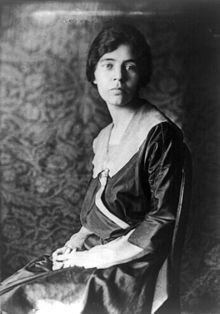Alice Paul | |
|---|---|
 Paul in 1918 | |
| Born | Alice Stokes Paul January 11, 1885 Mount Laurel, New Jersey, U.S. |
| Died | July 9, 1977 (aged 92) Moorestown, New Jersey, U.S. |
| Resting place | Westfield Friends Burial Ground, Cinnaminson, New Jersey, U.S. |
| Education | Swarthmore College (BS) Woodbrooke Quaker Study Centre London School of Economics University of Pennsylvania (MA, PhD) American University (LLB, LLM, DCL) |
| Occupation | Suffragist |
| Political party | National Woman's Party |
| Parent(s) | William Mickle Paul I Tacie Parry |
Alice Stokes Paul (January 11, 1885 – July 9, 1977) was an American Quaker, suffragette, suffragist, feminist, and women's rights activist, and one of the foremost leaders and strategists of the campaign for the Nineteenth Amendment to the United States Constitution, which prohibits sex discrimination in the right to vote. Paul initiated, and along with Lucy Burns and others, strategized events such as the Woman Suffrage Procession and the Silent Sentinels, which were part of the successful campaign that resulted in the amendment's passage in August 1920.[1]
Paul often suffered police brutality and other physical abuse for her activism, always responding with nonviolence and courage. She was jailed under terrible conditions in 1917 for participating in a Silent Sentinels protest in front of the White House, as she had been several times during earlier efforts to secure the vote for women in the United Kingdom.
After 1920, Paul spent a half-century as leader of the National Woman's Party, which fought for the Equal Rights Amendment, written by Paul and Crystal Eastman, to secure constitutional equality for women. She won a major permanent success with the inclusion of women as a group protected against discrimination by the Civil Rights Act of 1964.
- ^ Baker, Jean H., "Placards At The White House," American Heritage, Winter 2010, Volume 59, Issue 4.